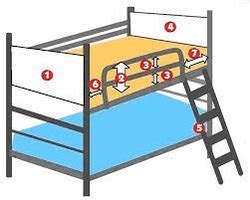Introduction
Bunk beds are a popular space-saving solution for homes with multiple children or limited square footage. However, safety should always be a top priority when using bunk beds, especially for younger children. Bunk bed railings play a crucial role in preventing falls and injuries. Here’s a comprehensive guide to bunk bed railings, covering everything you need to know to ensure a safe and comfortable sleeping environment for your little ones.

Why Bunk Bed Railings Are Essential
According to the American Academy of Pediatrics (AAP), children under the age of 6 should not sleep on the top bunk of a bunk bed due to the risk of falling. Bunk bed railings act as a physical barrier to prevent children from accidentally rolling off the bed while sleeping.
Statistics from the National Safety Council:
- Over 60,000 bunk bed-related injuries occur annually in the United States.
- Falls from bunk beds account for approximately 30% of all bed-related injuries in children under 15.
Choosing the Right Bunk Bed Railing
When selecting a bunk bed railing, consider the following factors:
- Material: Railings can be made from various materials such as metal, wood, or fabric. Metal railings are generally considered the most durable and secure.
- Height: Railings should extend at least 5 inches above the mattress to provide adequate protection.
- Gaps: Ensure that there are no gaps between the railings and the mattress that a child could get caught on.
- Latches: Railings should have secure latches that children cannot easily open independently.
- Compatibility: Choose a railing that is compatible with the specific bunk bed model you have.
Proper Installation and Use
Proper installation and use of bunk bed railings are crucial for maximum safety:
- Securely attach: Follow the manufacturer’s instructions carefully to ensure the railing is securely attached to the bunk bed frame.
- Always use: Make sure the railings are raised and latched before allowing children to sleep on the top bunk.
- Teach children: Instruct children on the importance of using the railings and how to latch them properly.
Common Mistakes to Avoid
- Using pillows or blankets instead of railings: This is an unsafe and ineffective substitute for proper railings.
- Leaving gaps between the railings and the mattress: This can create a hazard for children to get caught on and fall off the bed.
- Not using latches: Unlocked or unlatched railings can easily be pushed down by children, increasing the risk of falls.
- Ignoring the height requirement: Railings that are too short may not provide adequate protection.
Extending the Functionality of Bunk Bed Railings
“Sleep Dividers”
Bunk bed railings can be used to create a sense of privacy and space for children on the upper bunk. Attaching fabric or mesh curtains between the railings creates a cozy and enclosed sleep area.
“Play Den”
With some creativity, bunk bed railings can be transformed into a play den for children. Suspending blankets or fabric over the railings creates a private and imaginative space for play and relaxation.
“Storage Solution”
Incorporating shelves or bins into the design of bunk bed railings provides additional storage for toys, books, or other items. This helps keep the sleeping area tidy and organized.
Tables
Table 1: Bunk Bed Railing Materials
| Material | Durability | Cost |
|---|---|---|
| Metal | Excellent | High |
| Wood | Moderate | Moderate |
| Fabric | Good | Low |
Table 2: Bunk Bed Railing Height Requirements
| Child’s Age | Minimum Height |
|---|---|
| 3-5 years | 5 inches |
| 6-8 years | 6 inches |
| 9 and up | 7 inches |
Table 3: Bunk Bed Railing Spacing
| Product | Rail Spacing |
|---|---|
| Manufacturer A | 2.75 inches |
| Manufacturer B | 3 inches |
| Manufacturer C | 3.25 inches |
Table 4: Common Bunk Bed Railing Issues
| Issue | Cause | Solution |
|---|---|---|
| Loose railings | Improper installation | Tighten the bolts or screws. |
| Difficult to adjust | Rust or wear | Lubricate the hardware or replace the railings. |
| Children can unlatch | Weak or damaged latches | Replace the latches with new ones. |
Conclusion
Bunk bed railings are an essential safety feature that can significantly reduce the risk of falls and injuries. By choosing the right railings, installing them properly, and using them consistently, you can create a safe and comfortable sleeping environment for your children. Remember to involve your children in the process by teaching them the importance of using the railings and how to latch them securely. By following the guidelines outlined in this article, you can ensure that your bunk bed is a safe and enjoyable space for your little ones to sleep and play.
